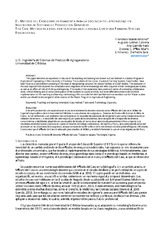Mostrar el registro sencillo del ítem
El método del caso como herramienta para la docencia y el aprendizaje en Ingeniería de Sistemas de Producción Ganadera
| dc.contributor.author | Maroto Molina, Francisco | |
| dc.contributor.author | Gómez Cabrera, Augusto | |
| dc.contributor.author | Garrido-Varo, Ana | |
| dc.contributor.author | De Pedro, E. | |
| dc.contributor.author | Pérez-Marín, D.C. | |
| dc.date.accessioned | 2018-06-06T11:05:26Z | |
| dc.date.available | 2018-06-06T11:05:26Z | |
| dc.date.issued | 2017 | |
| dc.identifier.issn | 2531-1336 | |
| dc.identifier.uri | http://hdl.handle.net/10396/16882 | |
| dc.description.abstract | Este artículo describe una experiencia en el uso de la herramienta docente conocida como Método del Caso en el Máster de Ingeniería Agronómica de la Universidad de Córdoba. Los estudiantes de la asignatura “Sistemas de Producción Animal: Análisis de Casos” se han enfrentado a un problema real consistente en la necesidad de soluciones de reingeniería para varias instalaciones de un cebadero de terneros. La resolución del caso requirió, por parte de los estudiantes, de la recopilación e integración de diversos conocimientos y habilidades adquiridos en sus estudios de Grado, así como de un ejercicio de pensamiento crítico e ingenio. Los resultados obtenidos fueron positivos en cuanto al fomento del trabajo colaborativo, del espíritu crítico y de la participación activa del alumnado en las actividades de la asignatura, aunque la implementación práctica de la metodología docente presentó algunas dificultades. Concluimos que el Método del Caso es adecuado para estudios de Máster y se debería fomentar su uso en otras asignaturas del título. | es_ES |
| dc.description.abstract | This paper describes an experience in the use of the teaching and learning tool known as Case Method in a Master Program in Agricultural Engineering of the University of Cordoba. The students of the course “Livestock Farming Systems: Case Studies” have been faced to a real problem consisting of the need of reengineering solutions for several facilities of a beef feedlot. The resolution of the case required from students the compilation and integration of some knowledge and skills acquired in their Undergraduate studies, as well as an effort of critical thinking and ingenuity. The results of the experience were positive in terms of promoting collaborative work, critical thinking and an active participation of the students in course activities, but some difficulties arose in the practical implementation of this teaching and learning methodology. We conclude that the Case Method is an excellent tool for Master studies and its use should be encouraged in other courses of the Master Program in Agricultural Engineering. | es_ES |
| dc.format.mimetype | application/pdf | es_ES |
| dc.language.iso | spa | es_ES |
| dc.publisher | UCOPress | es_ES |
| dc.rights | https://creativecommons.org/licenses/by-nc-nd/4.0/ | es_ES |
| dc.source | Revista de innovación y buenas prácticas docentes 1, 45-50 (2017) | es_ES |
| dc.subject | Innovación docente | es_ES |
| dc.subject | Método del caso | es_ES |
| dc.subject | Trabajo en equipo | es_ES |
| dc.subject | Tecnología | es_ES |
| dc.subject | Ingenio | es_ES |
| dc.subject | Teaching and learning innovation | es_ES |
| dc.subject | Case method | es_ES |
| dc.subject | Team work | es_ES |
| dc.subject | Technology | es_ES |
| dc.subject | Ingenuity | es_ES |
| dc.title | El método del caso como herramienta para la docencia y el aprendizaje en Ingeniería de Sistemas de Producción Ganadera | es_ES |
| dc.title.alternative | The case method as a tool for teaching and learning Livestock Farming Systems Engineering | es_ES |
| dc.type | info:eu-repo/semantics/article | es_ES |
| dc.relation.publisherversion | http://www.uco.es/ucopress/ojs/index.php/ripadoc/index | es_ES |
| dc.rights.accessRights | info:eu-repo/semantics/openAccess | es_ES |

